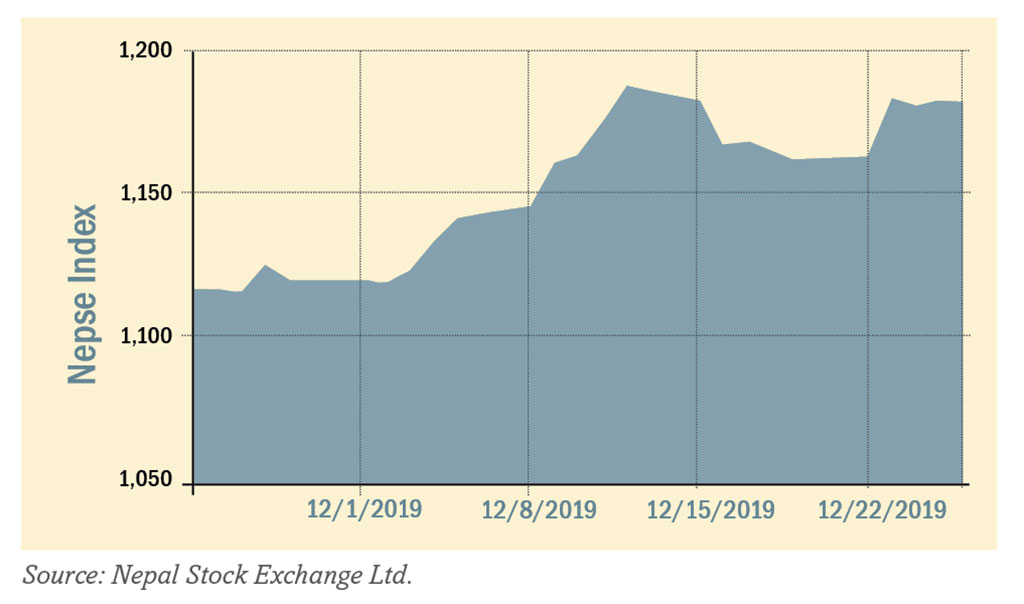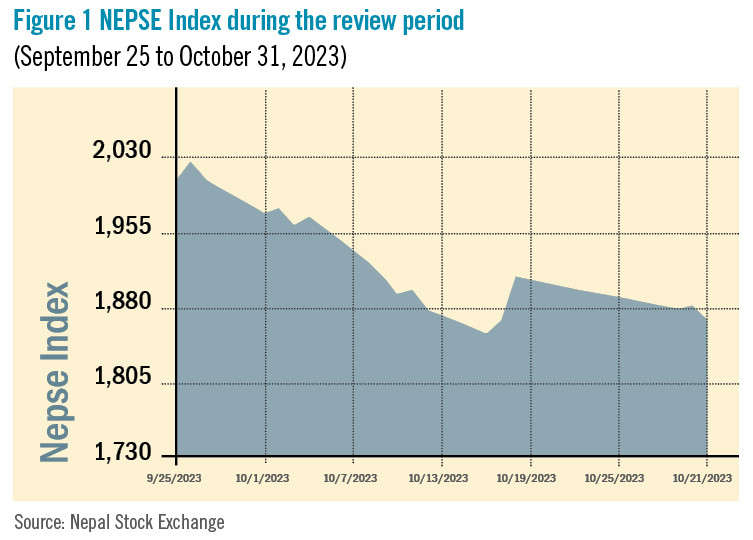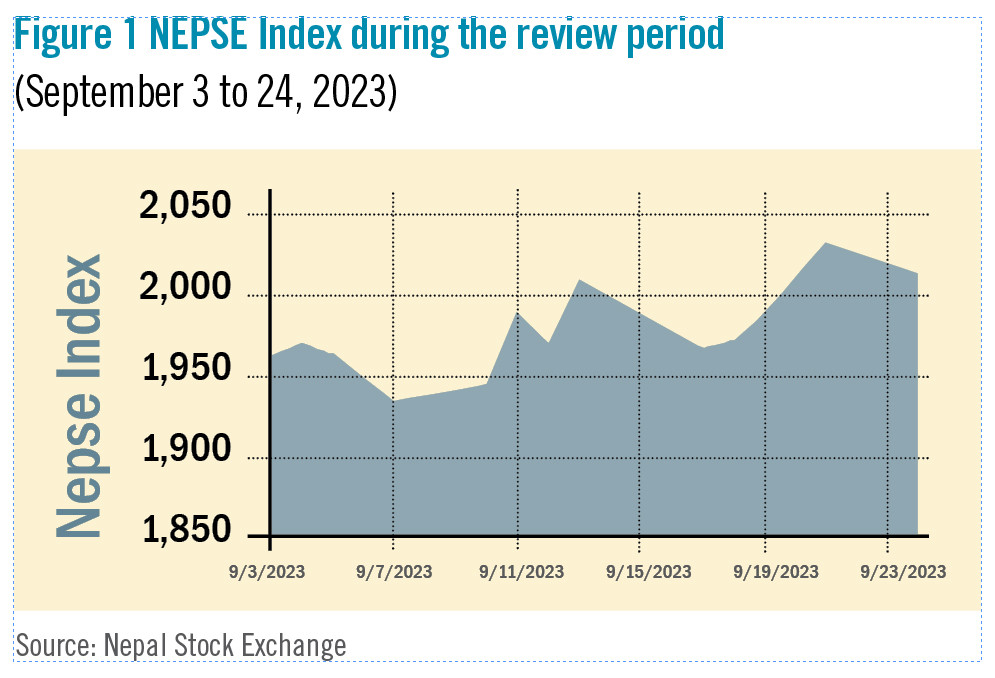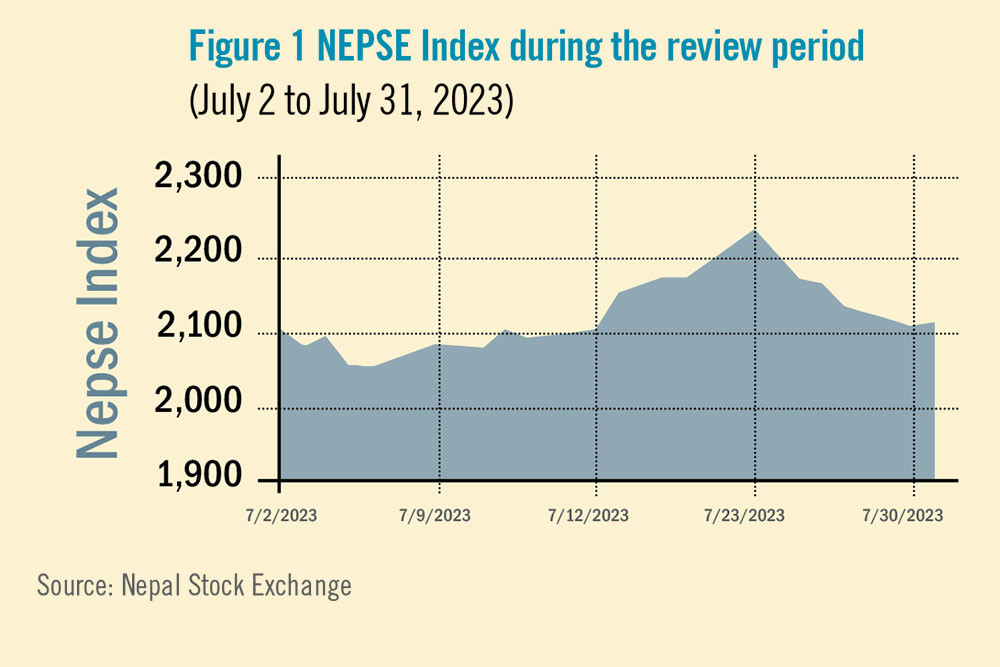
During the review period of January 21 to February 18, 2017, the Nepal Stock Exchange (NEPSE) index continued with its downward spiral as the index nosedived by 118.71 points (-8.22%) to close at 1343.85 points. The secondary market, yet again witnessed a turbulent month; the index started on a negative note and retreated below 1300 points, reaching 1252 points as on February 12, the lowest points in the past 11 months. However, since then the market has shown upward inclination with signs of improvement after the government’s commitment to conduct local elections within the time frame prescribed in the Constitution followed by expectation in ease of liquidity in the banking system.
During the review period, all sub-indices, except Manufacturing and Processing, landed in the red zone. The Insurance sub-index (-14.55%) led the pack of losers with decrease in share value of Life Insurance Company Nepal (- NPR 400), Shikhar Insurance (- NPR 309), Prime Life Insurance (- NPR 304) and Prudential Insurance (- NPR 301). The Finance sub-index (- 12.58%) followed suit as share value of Janaki Finance (- NPR 36), Sagarmatha Finance (- NPR 28), ICFC Finance (- NPR 23) and Seti Finance (-NPR 19) declined. Likewise, the Hydropower sub-index (-9.43%) continued its downward trend with decrease in share values of Chilime Hydropower (- NPR 92), Api Power Company (- NPR 32), Barun Hydropower (- NPR 28) and Arun Valley Hydropower (- NPR 25).
The Commercial Bank sub-index (-7.51%) also went down with decrease in share values of Nepal SBI Bank (- NPR 421), Standard Chartered Bank (- NPR 198) and Everest Bank (- NPR 168). Similarly, the Hotel sub-index (-5.23%) went down as share prices of key hotels such as Soaltee Hotel (- NPR 24), Oriental Hotels (- NPR 22) and Taragaon Regency (- NPR 9) went down. The Development Bank sub-index (-5.01%) also declined as Deproc Development Bank (- NPR 1,360), Womi Microfinance Sansthan (- NPR 282), Nagbeli Laghubitta Bikas Bank (- NPR 225) and Laxmi Laghubitta Bittiya Sansthan (- NPR 182) shed their share value. Furthermore, the Other sub-index (-3.66%) declined as - share value of Nepal Telecom (- NPR 32) and Hydroelectricity Investment and Development Company (- NPR 26) went down. Nonetheless, the Manufacturing and Processing sub-index (+3.24%) was the only sub-index that managed to remain in green zone with increase in share value of Unilever Nepal (+ NPR 2,000).



News and Highlights
With an aim to facilitate small investors, NEPSE has allowed small-volume transactions (less than 10 units) on a regular trading day i.e. Sunday to Thursday, which previously used to be traded only on Friday. However, as per NEPSE such transaction will not be taken into account while calculating the index value. Securities Board of Nepal (SEBON) issued a press release stating approval of amendment of Central Depository Service Regulation 2073 and Clearing and Settlement Bye Laws, 2073. Accordingly, the amendment has deducted the restriction on trading by the stock broker to three days from previous seven days if the broker is unable to do clearing and settlement within prescribed days i.e. T (Transaction)+3 day or if it fails to submit documents as required by SEBON. Further, the amendment also requires to make arrangement for investors to view their account statement online. Considering the current liquidity situation where banks are in shortage of loanable funds, SEBON has scrapped a rule which requires money collected from Initial Public Offer (IPO) or Further Public Offer (FPO) to be parked in Nepal Rastra Bank (NRB) for at least six days. Similarly, SEBON has also directed Standard Chartered Bank (SCB) to hold its FPO as it would worsen the ongoing liquidity crunch in the banking system. SCB was supposed to float 2.5 million shares at NPR 1,290 per share from February 20, 2017.
Outlook
In the past few months, the bearish trend has been prevalent in the secondary market, causing a free fall in the NEPSE index. Investors panicked due to margin calls from the Bank and Financial Institutions (BFIs) that obliged them to offload their shares amid the ongoing situation where BFIS are tightening their funds. Further, as BFIs are offering attractive interest rates on saving schemes, investors seem less tempted to invest in this bearish stock market. Lately the index is showcasing some improvements as investors are being lured by cheaper stock prices along with the expectation of positive political development and ease in banking liquidity.Disclaimer
This is an analysis from beed invest ltd. No expressed or implied warrant is made for usefulness or completeness of this information and no liability will be accepted for consequences of actions taken on the basis of this analysis.
Published Date: March 20, 2017, 12:00 am
Post Comment
E-Magazine
RELATED Beed Take





